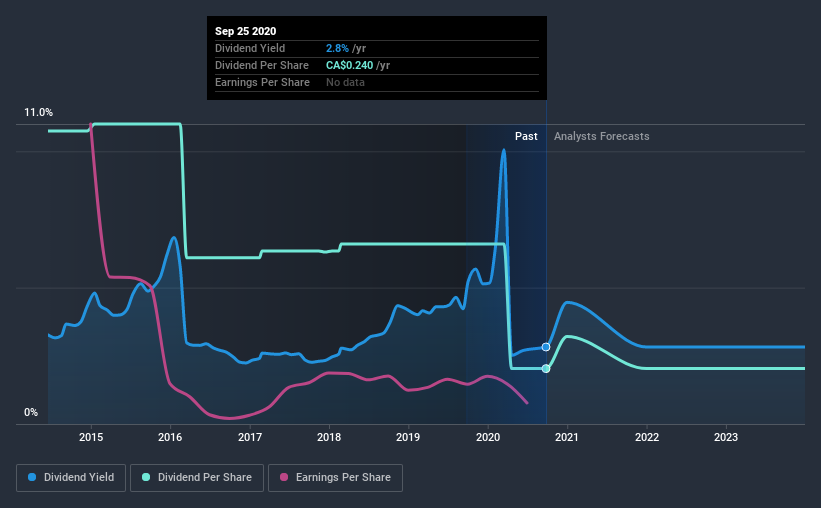Do These 3 Checks Before Buying PrairieSky Royalty Ltd. (TSE:PSK) For Its Upcoming Dividend

PrairieSky Royalty Ltd. (TSE:PSK) is about to trade ex-dividend in the next 3 days. You can purchase shares before the 29th of September in order to receive the dividend, which the company will pay on the 15th of October.
PrairieSky Royalty's next dividend payment will be CA$0.06 per share, on the back of last year when the company paid a total of CA$0.24 to shareholders. Based on the last year's worth of payments, PrairieSky Royalty has a trailing yield of 2.8% on the current stock price of CA$8.5. If you buy this business for its dividend, you should have an idea of whether PrairieSky Royalty's dividend is reliable and sustainable. As a result, readers should always check whether PrairieSky Royalty has been able to grow its dividends, or if the dividend might be cut.
View our latest analysis for PrairieSky Royalty
Dividends are typically paid from company earnings. If a company pays more in dividends than it earned in profit, then the dividend could be unsustainable. Last year, PrairieSky Royalty paid out 305% of its profit to shareholders in the form of dividends. This is not sustainable behaviour and requires a closer look on behalf of the purchaser. That said, even highly profitable companies sometimes might not generate enough cash to pay the dividend, which is why we should always check if the dividend is covered by cash flow. It paid out 88% of its free cash flow as dividends, which is within usual limits but will limit the company's ability to lift the dividend if there's no growth.
It's good to see that while PrairieSky Royalty's dividends were not covered by profits, at least they are affordable from a cash perspective. If executives were to continue paying more in dividends than the company reported in profits, we'd view this as a warning sign. Extraordinarily few companies are capable of persistently paying a dividend that is greater than their profits.
Click here to see the company's payout ratio, plus analyst estimates of its future dividends.
Have Earnings And Dividends Been Growing?
Companies with falling earnings are riskier for dividend shareholders. Investors love dividends, so if earnings fall and the dividend is reduced, expect a stock to be sold off heavily at the same time. PrairieSky Royalty's earnings have collapsed faster than Wile E Coyote's schemes to trap the Road Runner; down a tremendous 41% a year over the past five years.
Another key way to measure a company's dividend prospects is by measuring its historical rate of dividend growth. PrairieSky Royalty's dividend payments per share have declined at 24% per year on average over the past six years, which is uninspiring. While it's not great that earnings and dividends per share have fallen in recent years, we're encouraged by the fact that management has trimmed the dividend rather than risk over-committing the company in a risky attempt to maintain yields to shareholders.
To Sum It Up
Should investors buy PrairieSky Royalty for the upcoming dividend? Earnings per share have been in decline, which is not encouraging. Additionally, PrairieSky Royalty is paying out quite a high percentage of its earnings, and more than half its cash flow, so it's hard to evaluate whether the company is reinvesting enough in its business to improve its situation. It's not that we think PrairieSky Royalty is a bad company, but these characteristics don't generally lead to outstanding dividend performance.
Although, if you're still interested in PrairieSky Royalty and want to know more, you'll find it very useful to know what risks this stock faces. We've identified 3 warning signs with PrairieSky Royalty (at least 1 which is potentially serious), and understanding them should be part of your investment process.
A common investment mistake is buying the first interesting stock you see. Here you can find a list of promising dividend stocks with a greater than 2% yield and an upcoming dividend.
This article by Simply Wall St is general in nature. It does not constitute a recommendation to buy or sell any stock, and does not take account of your objectives, or your financial situation. We aim to bring you long-term focused analysis driven by fundamental data. Note that our analysis may not factor in the latest price-sensitive company announcements or qualitative material. Simply Wall St has no position in any stocks mentioned.
Have feedback on this article? Concerned about the content? Get in touch with us directly. Alternatively, email editorial-team@simplywallst.com.

 Yahoo News
Yahoo News 

